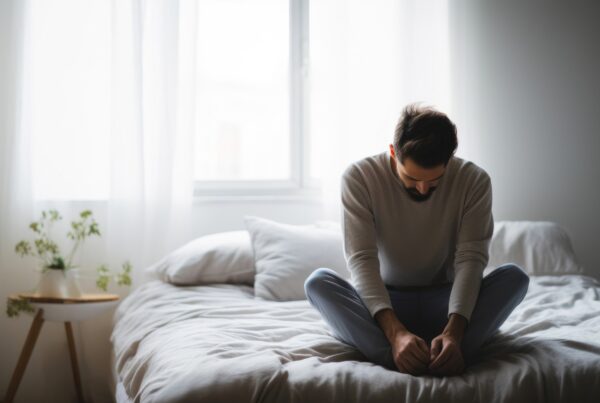”Question: How do I create a sleep schedule for my family?
Reading time: 5 Minutes
MWi Hack:
- A consistent and personalized bedtime routine can significantly improve sleep quality and overall well-being for the whole family.
MWi Summary:
-
- A consistent bedtime routine helps kids wind down and establishes healthy habits for better sleep quality.
- Adults can also benefit from a regular evening ritual to relax and prepare for restorative sleep.
- Tailor bedtime routines based on age: soothing activities for infants/toddlers, calming hobbies for kids/preteens, and personalized relaxation techniques for teens/adults.
- Create a personalized routine with a mix of activities like skincare, mindfulness, journaling, stretching, reading, and gratitude practice.
- Enhance your sleep environment with comfortable bedding, white noise, weighted blankets, eye masks, and appropriate lighting for optimal relaxation.
What’s the best bedtime routine for your kids? A calming and consistent bedtime routine can enhance the quality and depth of your slumber. But it’s not just kids who need a bedtime routine – parents can benefit from one too! Let’s explore the benefits of a bedtime routine for the whole family and tips on how to create the ultimate routine for restorative sleep.
The transformative power of bedtime routines
Why is a bedtime routine important?
Having a consistent nighttime routine can help kids wind down. But it also establishes healthy habits that can lead to better sleep quality. According to the National Sleep Foundation, having a regular bedtime routine can help improve overall sleep quality and reduce the amount of time it takes to fall asleep.
Adults can also benefit from having a set evening ritual to help them relax and prepare for sleep. It all comes down to consistency.
Consistency = supercharged sleep
By establishing a regular wind-down ritual, you can train your body and mind that it’s time to transition into a state of relaxation and prepare for restorative sleep. The positive impacts of a consistent bedtime ritual extend far beyond the nighttime hours. They can also influence your overall well-being, cognitive function, and emotional resilience throughout the day.
The impact on sleep quality
A harmonized bedtime routine facilitates the release of sleep-inducing hormones. It can also act as a buffer against the disruptive influences of things like stress and anxiety, which can inhibit a quality sleep.
Tailoring bedtime routines for different age groups
Infants and toddlers (0-3 years)
A soothing bedtime routine for little ones may involve gentle lullabies, cuddle time, and dimmed lighting to signal the approach of bedtime. Adding a cozy bedtime story or a warm bath can further enhance the winding-down experience for young sleepers.
Kids and preteens (4-12 years)
As kids transition through their formative years, incorporating calming activities such as reading, journaling, or mindfulness exercises can help them unwind and prepare for a full night’s rest. Eliminating screens at least 30-60 minutes before bedtime and engaging in relaxing conversations can also help fortify a peaceful bedtime routine for this age group.
Teens and young adults
As kids get older, some need even more sleep. You can help them create more personalized bedtime rituals based on their individual needs. Winding down might involve setting a peaceful ambiance with aromatherapy, stretching, reading, or reflective journaling. Embracing mindfulness practices or meditation can also serve as potent tools for fostering a more tranquil mindset before bedtime.
Crafting your personal bedtime routine
In addition to incorporating age-specific techniques, you can also mix and match different activities and practices to create a bedtime routine that resonates with you. Here are some ideas:
-
Morning preparation: Lay out your clothes, look at your calendar, take a shower, pack your lunch, or anything else that helps you feel organized and prepared for the next day.
-
Skincare: Take a few moments to follow a basic daily skincare routine, incorporating gentle and soothing products for a relaxing experience.
-
Soothe your senses: Help yourself drift off with a lavender-scented eye pillow. Or take a warm bath with soothing Epsom salts.
-
Unplug from technology: Turn off screens at least an hour before bedtime to help promote relaxation and reduce exposure to blue light.
-
Listen to soothing music: Create a playlist with calming tunes or nature sounds.
-
Mindful breathing: Take a few moments before getting into bed to focus on your breathing, inhaling slowly through the nose and exhaling deeply and intentionally through the mouth.
-
Journaling: Write down any thoughts, worries or reflections from the day in a journal to help declutter your mind before sleep.
-
Stretching: Loosen muscles with some light stretching or gentle yoga poses to release tension and prepare your body for rest.
-
Reading: Pick up a (not too stimulating) book or magazine and read for a few minutes to unwind and quiet your mind.
-
Gratitude practice: Many people pray or count blessings before bed. Take some time to think of things you are grateful for to cultivate a positive mindset before bedtime.
Turn up the cozy factor
Make sure your bedroom is set up for relaxation and comfort. Research has shown that darkness and temperature can both affect our sleep. Adjust the room temperature to your liking and make sure it’s dark enough for quality rest. Try these:
-
The right pillow: Consider investing in quality pillows designed for the positions you usually sleep in.
-
Appropriate bedding: Try swapping out sheets and blankets according to the season so you’re not too hot or too cold.
-
White noise machine: Block out external distractions and create a soothing environment with the help of a white noise machine or other bedtime sounds. Many apps offer popular bedtime playlists such as ocean sounds, nature sounds, or spa-like instrumentals.
-
Weighted blanket: Many people swear by the calming effects of deep pressure stimulation with a weighted blanket, which can promote relaxation and help lessen disruptive sleep patterns.
-
Eye mask or light-blocking curtains: Minimize stimulating light sources and enhance melatonin production for deeper sleep with an eye mask and/or special curtains and shades that block out light.
-
Night light: If you prefer some light in the room or get up frequently in the night, keep a soft, dim night light in your sleep space to provide just enough illumination for navigation during nighttime bathroom trips.
Sweet dreams ahead
Bedtime routines are highly personal and can be tailored to suit your unique preferences and needs. Consistently engaging in practices and activities that promote relaxation and tranquility before bed can help create a more conducive environment for restful sleep and rejuvenation. Here’s to sweet dreams ahead!
MWi would like to thank Green Light for sharing these insights with our community. Click the button below to go to the original article:






